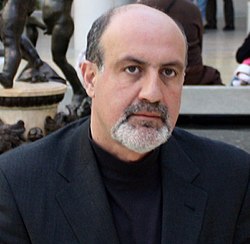Nassim Nicholas Taleb Quote
Since the Enlightenment, in the great tension between rationalism (how we would like things to be so they make sense to us) and empiricism (how things are), we have been blaming the world for not fitting the beds of rational models, have tried to change humans to fit technology, fudged our ethics to fit our needs for employment, asked economic life to fit the theories of economists, and asked human life to squeeze into some narrative.
Nassim Nicholas Taleb
Since the Enlightenment, in the great tension between rationalism (how we would like things to be so they make sense to us) and empiricism (how things are), we have been blaming the world for not fitting the beds of rational models, have tried to change humans to fit technology, fudged our ethics to fit our needs for employment, asked economic life to fit the theories of economists, and asked human life to squeeze into some narrative.
Related Quotes
About Nassim Nicholas Taleb
Nassim Nicholas Taleb (; alternatively Nessim or Nissim; born 12 September 1960) is a Lebanese-American essayist, mathematical statistician, former option trader, risk analyst, and aphorist. His work concerns problems of randomness, probability, complexity, and uncertainty.
Taleb is the author of the Incerto, a five-volume work on the nature of uncertainty published between 2001 and 2018 (notably, The Black Swan and Antifragile). He has taught at several universities, serving as a Distinguished Professor of Risk Engineering at the New York University Tandon School of Engineering since September 2008. He has also been a practitioner of mathematical finance and is currently an adviser at Universa Investments. The Sunday Times described his 2007 book The Black Swan as one of the 12 most influential books since World War II.
Taleb criticized risk management methods used by the finance industry and warned about financial crises, subsequently profiting from the Black Monday (1987) and the 2008 financial crisis. He advocates what he calls a "black swan robust" society, meaning a society that can withstand difficult-to-predict events. He proposes what he has termed "antifragility" in systems; that is, an ability to benefit and grow from a certain class of random events, errors, and volatility, as well as "convex tinkering" as a method of scientific discovery, by which he means that decentralized experimentation outperforms directed research.
Taleb is the author of the Incerto, a five-volume work on the nature of uncertainty published between 2001 and 2018 (notably, The Black Swan and Antifragile). He has taught at several universities, serving as a Distinguished Professor of Risk Engineering at the New York University Tandon School of Engineering since September 2008. He has also been a practitioner of mathematical finance and is currently an adviser at Universa Investments. The Sunday Times described his 2007 book The Black Swan as one of the 12 most influential books since World War II.
Taleb criticized risk management methods used by the finance industry and warned about financial crises, subsequently profiting from the Black Monday (1987) and the 2008 financial crisis. He advocates what he calls a "black swan robust" society, meaning a society that can withstand difficult-to-predict events. He proposes what he has termed "antifragility" in systems; that is, an ability to benefit and grow from a certain class of random events, errors, and volatility, as well as "convex tinkering" as a method of scientific discovery, by which he means that decentralized experimentation outperforms directed research.
